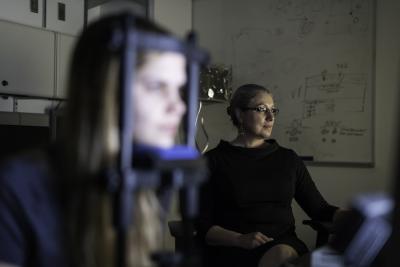
A research team including professor of ophthalmology Krystel Huxlin (right, in a 2019 photo) provided stroke patients with a form of physical therapy for the visual system using a device Huxlin developed. Image credit: University of Rochester / J. Adam Fenster
A person who has a stroke that causes vision loss is often told there is nothing they can do to improve or regain the vision they have lost.
But research from the University of Rochester, published in the journal Brain, may offer hope to stroke patients in regaining vision.
The Rochester team found that survivors of occipital strokes—strokes that occur in the occipital lobe of the brain and affect the ability to see—may retain some visual capabilities immediately after the stroke, but these abilities diminish and eventually disappear permanently after approximately six months. By capitalizing on this initial preserved vision, early vision training interventions can help stroke patients recover more of their vision loss than if training is administered after six months.